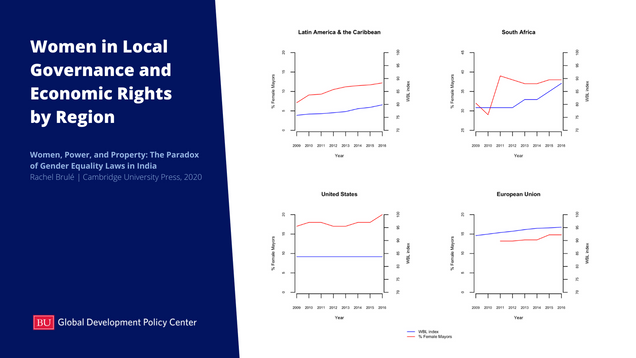Supporting Women’s Economic Empowerment in the Changing World of Work at CSW66

From March 14-25, the Commission on the Status of Women is conducting its 66th session (CSW66), where member states, civil society organizations and United Nations entities discuss the most pressing matters of gender inequality in the context of the climate crisis. Established by the UN Economic and Social Council (ECOSOC) in 1946, the CSW plays a key role in creating global standards of gender equality and mainstreaming a gender perspective in all activities of the UN.
Bringing together those striving for the empowerment of women and girls, every year the CSW pursues a priority theme – the theme for 2022 being “achieving gender equality and the empowerment of all women and girls in the context of climate change, environmental and disaster risk reduction policies and programmes.” The sessions also strive to not lose sight of issues discussed by previous iterations, with the CSW66 review theme considering the conclusions made in 2017 on women’s economic empowerment in the changing world of work.
The review theme holds special significance, as progress on women’s economic empowerment has either stalled or worsened during the COVID-19 pandemic. According to Oxfam International, women globally lost more than 64 million jobs, costing at least $800 billion in lost income – equivalent to more than the combined GDP of 98 countries – in 2020 alone. This amounted to a 5 percent job loss rate, compared to a 3.9 percent job loss rate for men. Importantly, this estimate covers only the formal labor sector; when considering women are overrepresented in the informal sector, the damage caused by the COVID-19 pandemic is staggering.
At the Human Capital Initiative (HCI), the Program on Women’s Empowerment Research (POWER) works to conduct evidence-based research into the causes and effects of women’s empowerment on human well-being in low- and middle-income settings. Across domains such as women in the labor market, women’s political and economic inclusion and maternal and child health, HCI researchers explore the state of women’s economic empowerment today.
Bridging the gap – women and the labor market
In the past five decades, more women have joined the workforce, but the gender gap in the labor market has stubbornly persisted. In a recent National Bureau of Economic Research working paper, Patricia Cortés and Jessica Pan find in the US alone, close to two-thirds of the overall gender gap in earnings can be credited to the differential impacts of childcare on women and men, meaning the differential roles of parents, with childcare largely considered the responsibility of women, impose larger penalties on women’s career trajectories than men’s. These findings indicate that government-supported childcare policies must be one of the major points of discussion in any conversation on women’s economic empowerment.
Furthermore, new POWER research indicates that when women are in the job market, gender differences in labor market search behavior contribute to the longstanding gender pay gap. Using survey data from undergraduate business majors at Boston University, Cortés, Pan, Laura Pilossoph and Basit Zafar find that women accept jobs close to a month earlier than men, indicating greater risk aversion among women. This gender risk differential was reported to create a gender earnings gap of about 25 percent in early career stages.
Reproductive health care and the job market
Regarding the differential impacts of childcare on men and women, pre- and post-partum family planning play an important role, as the implications of reproductive health care go beyond maternal mortality and into women’s time-use and investment in education and the labor force. The World Health Organization recommends women wait at least 24 months after a live birth before becoming pregnant again. Poorly spaced births are reported to be associated with mortality and morbidity for women and children.
In a recent study on family planning in urban Malawi, Mahesh Karra, David Canning, Dan Maggio, Mugi Gao and Bagrey Ngwira report improving access to high quality post-partum family planning services for new and expecting mother increases the use of contraceptives by 5.9 percent points. What is more, women were 42 percent less likely to have a second pregnancy in the two years after a live birth. While fertility may be influenced by various factors, access to family planning methods that can encourage contraceptive use may increase women’s agency and decision-making regarding their time-use and participation in the labor market.
For resilient systems, include women in politics
One of the key areas of focus of the CSW66 dialogue is the need for resilient systems. One way to d build resilience is by supporting women’s political and economic empowerment. Rachel Brulé’s award-winning book Women, Power and Property: The Paradox of Gender Equality Laws in India explores how women’s political representation in India is crucial to women’s economic autonomy. The book investigates this relationship by examining how the mandated quota system for female political participation enables women to claim ownership of land, a fundamental economic right. Brulé also identifies the persistent, linked phenomena of women’s economic and political exclusion in the contemporary world by visualizing female political participation (percentage of female mayors in each region in red) and women’s economic inclusion (the Women, Business and Law Index, in blue), finding female politicians make up no more than 40 percent of representatives in any region around the world.

While CSW66 reviews women’s economic empowerment, the underpinning elements of systemic gender differences in the labor market and in politics need to be addressed. How can policymakers move the needle? Policies across the board need to bolster the freedom of choice for women’s economic empowerment with a range of efforts from providing childcare facilities to promoting time flexibility and parental leave. Supporting women’s political representation is also key to ensuring the enforcement of gender equality policies and laws. As CSW66 wraps up its discussions this week, the international community should continue to advance policies and support for women’s economic and political empowerment.
Never miss an update: subscribe to the Human Capital Initiative newsletter.